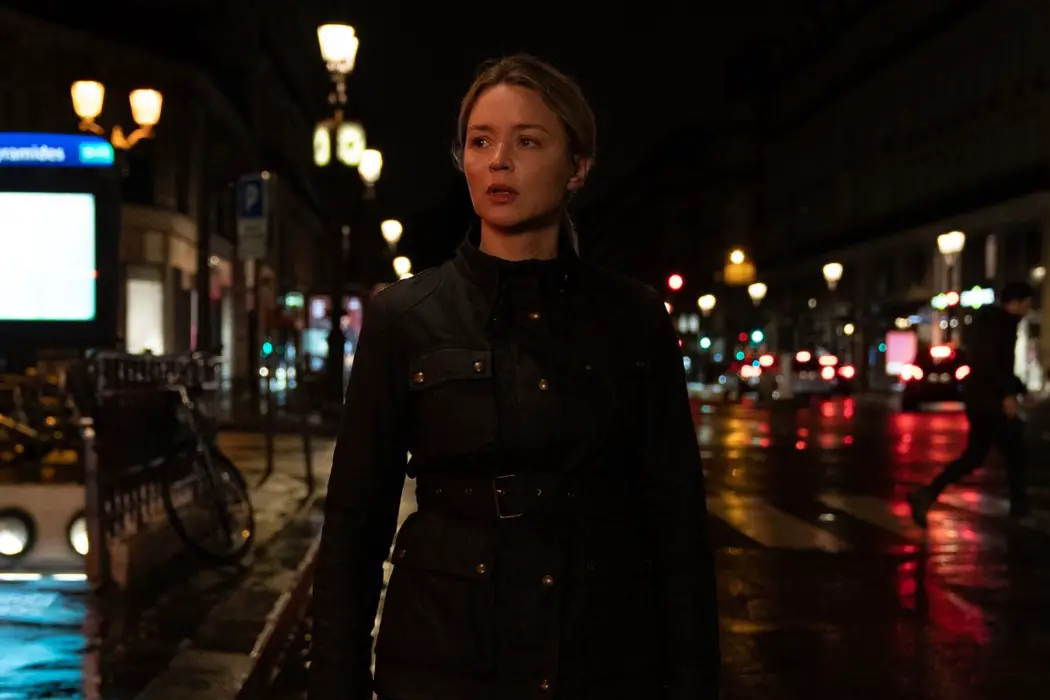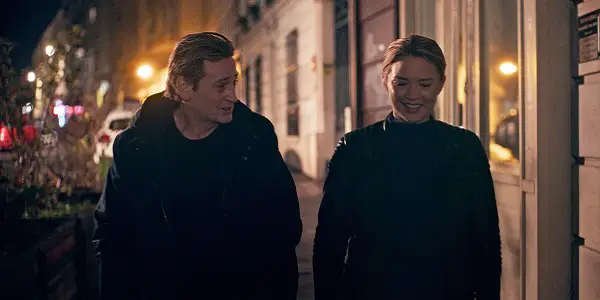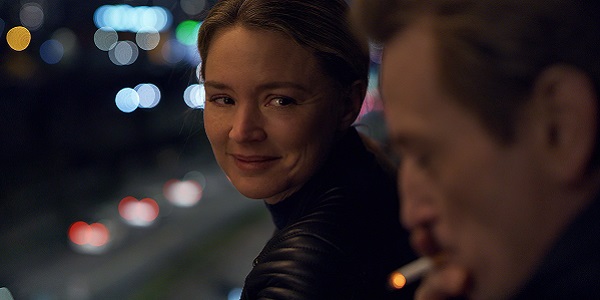REVOIR PARIS: Healing After Horror

Lee Jutton has directed short films starring a killer toaster,…
How do you resume normal life after an earth-shattering event? That is the question that drives Revoir Paris (Paris Memories), the story of a woman struggling to piece together missing memories from the night she survived a mass shooting at a Parisian bistro. Starring Virginie Efira (Benedetta, Other People’s Children) in a poignant performance that earned her the César Award for Best Actress, the film is a moving tribute to the power of human connection inspired by the experiences of writer-director Alice Winocour’s brother, a survivor of the 2015 attack at the Bataclan concert hall.
Before and After
A Russian translator, Mia (Efira) finds herself in the bistro on that fateful night due to a series of random, unforeseen circumstances: her partner, Vincent (Grégoire Colin) left their dinner at another restaurant early to return to the hospital where he works, after which Mia got caught in a thunderstorm on her motorcycle and decided to take refuge at the first place she found. Observing the other diners around her — a group of young Asian women taking silly selfies with escargot, a birthday party complete with a sparkler-laden cake — Mia writes and sips a glass of wine, more concerned with the ink she’s accidentally gotten all over her hands than the possibility she might die that night.

These almost mundane opening scenes are rife with tension simply because the audience is aware of what is coming next, even if the characters within the film are not. The shooting that follows is presented by Winocour in a realistic, straightforward way that lacks the sensationalism filmmakers often apply to such violent events and makes the entire sequence all the more terrifying: the gunshots that ring out of nowhere, the initial screams and sobs that all too quickly dissolve into an eerie silence, the bodies abruptly dropping to the ground, Mia crawling across broken glass in the darkness, desperate to find a hiding spot before the killer finds her. The killer’s face is not clearly seen, nor are his motivations ever explored in the film; Revoir Paris is not concerned with the perpetrators of such an attack, but the survivors.
Three months later, Mia returns to Paris after recuperating at her mother’s house. She cannot remember anything that happened after the killer began shooting that night, but certain triggers cause images to surface out of the murk with alarming clarity. With Vincent and her friends unable to understand what she went through — what she’s still going through—Mia seeks solace in a support group for survivors and attempts to retrace the steps she took that night. And when she realizes that someone was holding her hand the whole time, helping her summon the courage to survive, she is determined to find out whether or not he is still alive.
Holding Tight
Throughout Revoir Paris, the importance of human connection is paramount. Mia speaks with a female employee at the bistro who recalls how she hid in the air vents with a young Australian man; they held each other and kissed as they hid, desperate for some tenderness in what they thought might be their final moments. Meanwhile, Mia wants nothing more than to know that someone who did something as seemingly simple as holding her hand is okay; that small gesture, to her, is monumental.
But the process of remembering what happened and finding the man from that night is slow and painful — especially when it is revealed that the man in question is an undocumented immigrant from Senegal who has essentially vanished into the ether. (Watching Mia doggedly question the Parisian immigrant community in order to find him can be somewhat irritating; I understand that you’re dealing with almost unfathomable trauma, but can’t you understand why these folks are suspicious of your motives and reluctant to answer your probing questions?)

Along the way, Mia bonds with Thomas (Benoît Magimel), a flirtatious man with a shattered leg who was the one celebrating with that sparkler-laden cake that night, and Felicia (Nastya Golubeva Carax), a teenager who longs to relive her parents’ last moments before they were killed. There is also a woman who insists that Mia selfishly locked herself in the bistro bathroom and refused to let anyone else in; the true story is one that throbs with the pain of survivor’s guilt, and results in one of the most gut-wrenching reveals of the film. And when Thomas and Mia gate-crash a wedding party, dancing and helping Thomas overcome his crippling post-attack claustrophobia, it’s impossible not to root for their strange, sweet romance, rooted as it is in a trauma that their current partners will never understand.
All of the performances in Revoir Paris are excellent, but Efira’s subtle, sensitive work anchors the story; she turns the loosely sketched-out character of Mia into a dynamic portrait of how ordinary people deal with extraordinary circumstances. Winocour cuts between Mia’s story and snippets of other victims narrating what happened to them, presented in the style of their postings in a Facebook group for survivors. She shows us not just the emotional aftermath of such an event but the procedural side, such as Mia going to the police station to pick up a plastic bag containing her belongings from that night, or city workers sweeping up the piles of flowers and notes that were placed outside the bistro as a memorial. These seemingly small but no less powerful moments highlight Winocour’s deeply personal approach to the story — it’s hard to imagine anyone but the close family member of a survivor thinking to include them—and serve as a brutal reminder of how the rest of the world keeps turning after a tragedy.
Conclusion
Revoir Paris is not an easy film to watch, but the emotional journey that Mia and her fellow survivors take to find what the support group leader describes as “the diamond in the trauma” is a gratifying one, made all the more so by Winocour‘s empathetic storytelling.
Have you seen Revoir Paris? What did you think? Let us know in the comments below!
Revoir Paris opens in New York at Film at Lincoln Center and IFC Film Center on June 23, 2023 and in Los Angeles at Laemmle’s Royal on June 30, 2023, with national expansion to follow.
Watch Revoir Paris
Does content like this matter to you?
Become a Member and support film journalism. Unlock access to all of Film Inquiry`s great articles. Join a community of like-minded readers who are passionate about cinema - get access to our private members Network, give back to independent filmmakers, and more.
Lee Jutton has directed short films starring a killer toaster, a killer Christmas tree, and a not-killer leopard. Her writing has appeared in publications such as Film School Rejects, Bitch: A Feminist Response to Pop Culture, Bitch Flicks, TV Fanatic, and Just Press Play. When not watching, making, or writing about films, she can usually be found on Twitter obsessing over soccer, BTS, and her cat.













